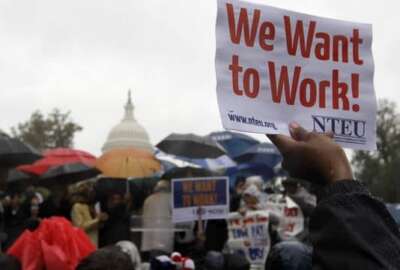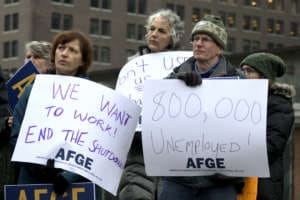

A federal district judge refused to compel the executive branch to find an immediate end to the government shutdown's impacts on excepted federal employees work...
UPDATED on Tuesday, Jan. 15, 2019 at 2:45 p.m. to reflect a federal district court’s decision.
A federal district judge on Tuesday refused to compel the executive branch to find a way to end the government shutdown’s impacts on federal employees.
The National Treasury Employees Union filed a temporary restraining order seeking injunctive relief from the current partial shutdown. Specifically, it wanted to prohibit agencies from forcing excepted employees to work without pay.
“If employees are working, they have to be paid,” NTEU National President Tony Reardon said. “If there is no money to pay them, then they should not be working. The shutdown, now in its fourth week, has become downright untenable for tens of thousands of employees who have no way to pay for their basic living expenses. We’ve asked our elected officials to end this disaster. Now we are asking a federal judge.”
Federal District Judge Richard Leon heard arguments Tuesday afternoon in the U.S. District Court for the District of Columbia on a variety of constitutional challenges to the current partial government shutdown.
Leon’s decision means that the status quo remains: Excepted employees are still required to work without pay for the duration of the partial government shutdown.
Ultimately, NTEU said it wanted to “put pressure on the political branches to do the right thing [and] at a minimum, not make people come to work if they’re not going to get paid and ideally get them to come to terms with the situation at hand and reopen government,” Greg O’Duden, the union’s general counsel, said Monday in an interview.
NTEU’s latest request was closely aligned with a rather nuanced lawsuit the union also filed last week.
In this particular challenge, NTEU argued that the Antideficiency Act, which essentially prohibits agencies from spending money they don’t have, violates the appropriations clause of the U.S. Constitution. The appropriations clause directs agencies to spend obligated funds only if Congress has appropriated such funds.
Therefore, requiring certain employees to work without pay during a lapse in appropriations violates existing law, according to NTEU’s argument.
“The government is arguably obligating itself to pay them at some uncertain point in the future,” O’Duden said. “Our position is the federal government can’t do that, because the appropriations clause makes very clear that the power of the purse is with Congress and that financial obligations can only be entered into if there have been appropriated funds provided.”



“Excepted employees” are typically workers who are considered essential to protecting life and property. But for NTEU, the IRS employees who may be recalled in the next few days to handle customer service work and process refunds, aren’t truly “excepted.”
“These are not jobs that pose any kind of imminent threat to life or property,” O’Duden said. “They’re just regular jobs, and the administration is hoping to avoid the inconvenient effect of the law by bringing them and also avoiding the political outcry that would occur if people, for instance, didn’t get their tax refunds on time.”
The D.C. district court has also consolidated two other similar lawsuits on government shutdown with the NTEU challenge. The National Air Traffic Controllers Association last week also challenged the legality of requiring excepted employees to work without pay during the government shutdown.
The Kator, Parks, Weiser and Harris law firm filed its own lawsuit on behalf of four individual federal employees working without pay during the shutdown. The KPWH suit claims this practice violates the 13th Amendment’s prohibition of “involuntary servitude.”
Federal employee unions have filed several other legal challenges to government shutdown. Here’s a roundup of the class-action lawsuits that are still pending — and could provide eventual relief to federal employees impacted by the partial shutdown.
A Washington-based law firm, Kalijarvi, Chuzi, Newman and Fitch, has offered a now-familiar legal challenge against the federal government over the current partial shutdown.
The lawsuit argues the government’s failure to pay excepted employees wages and overtime during the shutdown is a violation of the Fair Labor Standards Act (FLSA).
The firm filed the class-action lawsuit with the U.S. Court of Federal Claims on behalf of the American Federation of Government Employees. It seeks back pay, including overtime, and liquidated damages for exempted employees forced to work without pay during the partial government shutdown.
AFGE and the firm filed its first lawsuit challenging the legality of the government shutdown on the last day of 2018.
AFGE since amended its complaint last week to reflect that some 420,000 excepted employees working without pay during this government shutdown missed their first paychecks of 2019 on Jan. 11.Heidi Burakiewicz, a partner with KCNF leading the lawsuit, told the Federal Drive with Tom Temin she’s confident the court will rule in favor of federal employees.

“Hundreds of thousands of federal employees have now been working for two weeks under sometimes dangerous conditions,” she said last week in a statement. “While we hoped the shutdown would have ended in time for employees to get their paychecks for the first full pay period following the shutdown, we now have every indication that the employees will miss their paychecks for work performed between Dec. 23 and Jan. 5. That is a blatant violation of the Fair Labor Standards Act.”
The AFGE challenge names Justin Tarovisky and Grayson Sharp, employees at the Bureau of Prisons, who have both worked on the first day of the government shutdown — Dec. 23, the last day of the final pay period in 2018 — and during the following two weeks for the first pay period of 2019.
KCNF DC will set up an electronic sign-up system so interested employees can join the case. In the meantime, federal employees should send their questions about the lawsuit to 2018shutdownlawsuit@kcnlaw.com.
Burakiewicz filed a similar lawsuit on behalf of the AFGE and roughly 25,000 “excepted” employees during the 2013 16-day government shutdown.
Judge Patricia Elaine Campbell-Smith, then chief judge, sided with the plaintiffs. Agencies are still obligated to pay employees in accordance with the FLSA despite provisions in the Antideficiency Act, the judge ruled.
A consultant is still calculating damages — equal to twice the pay for the shutdown period — owed to impacted employees of the 2013 shutdown.
Both parties met back in August to review a proposed methodology for calculating the damages, according to the most recent status report on the matter. Attorneys for the plaintiffs asked for information about the proposed methodology, while federal attorneys are working with agencies to quickly gather necessary payroll data for the impacted employees.
Federal employee lawyers are also contacting plaintiffs who likely won’t receive liquidated damages based preliminary determinations. Once both parties agree to the methodology and collect all outstanding data, a consultant can begin to calculate damage payments.
The next update on the status of the damage calculations is due Jan. 21.
Meanwhile, at least two other federal employee unions have filed similar lawsuits again the federal government, again citing challenges with the Fair Labor Standards Act.
NTEU filed and then updated its own class-action lawsuit in the same court, the U.S. Court of Federal Claims. Again, it argued the government is in violation of the FLSA by having certain “excepted” employees work without pay.
NTEU’s lawsuit names Eleazar Avalos and James Davis, both “excepted” employees who have been working at Customs and Border Protection without pay during the partial government shutdown.
The National Federation of Federal Employees filed its own lawsuit late last Friday. NFFE’s challenge names excepted employees at the Forest Service, National Oceanic and Atmospheric Administration, National Weather Service and Federal Aviation Administration.
NFFE also argued the government has violated the FLSA in requiring excepted employees to work without pay. It urged the Court of Federal Claims to consolidate its case, along with the NTEU and AFGE claims.
Copyright © 2024 Federal News Network. All rights reserved. This website is not intended for users located within the European Economic Area.
Nicole Ogrysko is a reporter for Federal News Network focusing on the federal workforce and federal pay and benefits.
Follow @nogryskoWFED
